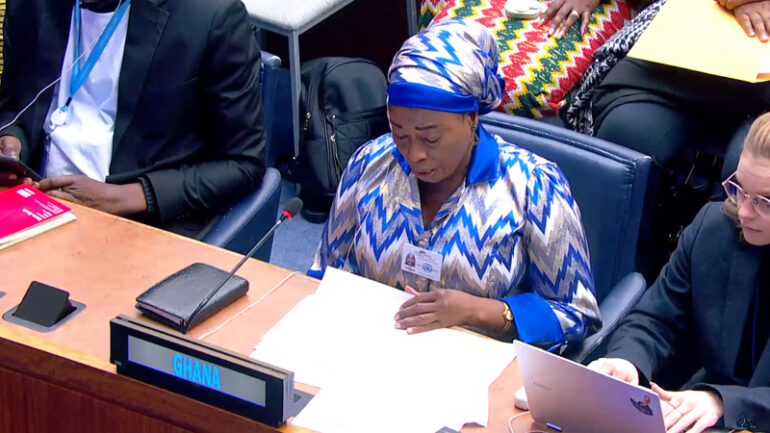Statement by Ghana at 62nd Session of the Commission for Social Development (CSocD62)

- Posted by admin
- Posted in News, Statement & Remarks
Hon. Hajia Lariba Abudu
Minister for Gender Children
and Social Protection.
United Nations, New York
February 06 2024
AT THE 62ND SESSION OF THE COMMISSION FOR SOCIAL DEVELOPMENT (CSOCD62) ON AGENDA ITEM 3(a):
“FOSTERING SOCIAL DEVELOPMENT AND SOCIAL JUSTICE THROUGH SOCIAL POLICIES TO ACCELERATE PROGRESS ON THE IMPLEMENTATION OF THE 2030 AGENDA FOR SUSTAINABLE DEVELOPMENT AND TO ACHIEVE THE OVERARCHING GOAL OF POVERTY REDUCTION”
Madam Chair, distinguished delegates,
I consider it an honour to address the 62nd Session of this Commission. At the outset, allow me to congratulate you, Madam Chair, and the members of the Bureau on your election. My delegation is confident that your leadership will steer our deliberations towards a successful and constructive outcome as we strive to fulfill the commitments of the World Summit for Social Development and the Copenhagen Declaration.
Ghana aligns itself with the statements delivered on behalf of the African Group and the Group of 77 and China, and thanks the Secretary-General for his report under this agenda item and takes note of the recommendations contained therein.
Madam Chair, this year’s session convenes under the theme of fostering social development and justice, echoing the 2030 Agenda’s call to action. While we recognize the progress achieved since Copenhagen, we must also face the sobering realities that persist. Data by the World Bank indicates that, globally, poverty remains a profound challenge, with Sub-Saharan Africa being home to a significant portion of the world’s extremely poor. In Ghana, despite considerable economic growth, inequality and poverty persist.
Ghana is, therefore, vigorously enacting transformative policies to ensure equitable social development. Rooted in the Fourth Republic Constitution of my country are our legal frameworks, which enshrine equality and labor rights and promote social protection and inclusion. Policies such as the Education Capitation Grant and Free Senior High School have catalyzed access to quality education, reaching millions and fostering long-term poverty reduction. Our National Household Registry is pivotal, collecting socioeconomic data to target aid where it’s most needed. The Livelihood Empowerment Against Poverty (LEAP) program is a testament to this, providing indexed financial support to over 1.5 million Ghanaians and mitigating the impact of poverty.
Simultaneously, the Ghana School Feeding Program nourishes nearly 4 million pupils, sustaining education through nutrition, while creating jobs and markets for local farmers. Complementing these efforts, the Planting for Food and Jobs initiative modernizes agriculture, enhancing food security and augmenting farmer incomes. The National Health Insurance Scheme further exemplifies our commitment, covering over 11.7 million citizens, including the most vulnerable.
Madam Chair, collaboration with global partners including the World Bank and UNICEF fortifies our initiatives, such as the Ghana Productive Safety Net Project, which introduces inclusive financial strategies to ensure a sustainable exit from poverty. Our commitment extends to robust case management and community engagement through platforms like the Single Window Citizens Engagement Services, offering accessible channels for our citizens to voice their needs and receive support.
These concerted efforts illustrate Ghana’s unwavering dedication to crafting a society where social protection, economic participation, and justice are not ideals but realities for every citizen.
Madam Chair, to address challenges associated with social development at a global level, our collective efforts must be strategic, and data driven. We therefore urge a scale-up of investment in social protection systems to protect against the impact of economic shifts and to foster more inclusive growth. We also advocate for the strengthening of partnerships to leverage shared knowledge and resources.
Furthermore, given the transformative potential of agriculture for economies and livelihoods, we recommend prioritizing investments in modern, sustainable agricultural practices that ensure food security and economic empowerment at both national and regional levels.
In conclusion, Madam Chair, Ghana stands resolute in our commitment to social development and poverty eradication. We stand ready to engage, learn, and contribute within this Commission’s framework, ensuring that the goals we set are not only aspirational but achievable.
I thank you.
